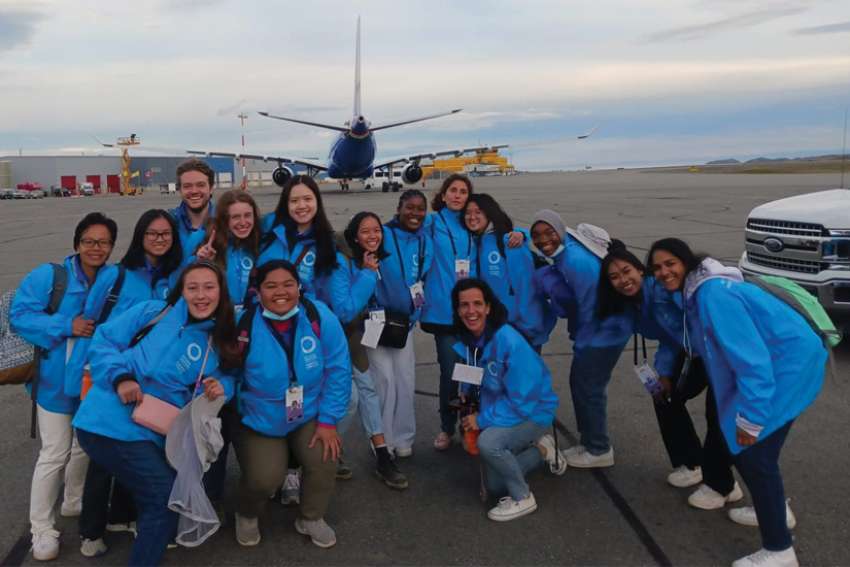The trip’s lauded operation was possible without the help of volunteers from coast-to-coast.
Ann-Marie Parenas, an incoming first-year nursing student at Toronto Metropolitan University, heard of the volunteer opportunity through her connections at Kintore College, an all-female student residence at the University of Toronto.
“I tried not to overthink, so I said simply, ‘It’s the Pope and a very solemn event for the Indigenous Peoples of Canada. Not everyone is given such a blessed opportunity.’”
Sarah Rebello, an employee at the Lycncroft Hospitality Training Centre in Toronto, became aware of the trip needing helpers support through friends at work. She admitted she was initially a bit timid to volunteer.
“There was a bit of hesitation since I wasn’t sure what was going to be entailed in the trip, and uncertainty is always a bit fearful for me. I think what really allowed [me] to overcome the hesitation was recognizing it as a unique opportunity to help support Pope Francis in the reconciliation he is trying to live and encourage others to live.”
Parenas and Rebello supported this mammoth logistical effort by transporting items throughout the various event venues. Specifically, they set up and took down chairs and tables, prepared rooms for visiting priests and media personnel, delivered food and water to the crowds, disposed of garbage and completed various other random tasks. Couriering items via golf cart was a standout experience for Rebello.
Topping the hustle and bustle of volunteerism was the presence of Pope Francis and an entire community of believers.Parenas vividly recalls the emotions she experienced at key moments.
“The first time I was in his presence, I was happy and surrounded by people. The second [time I saw him, I was] more alone so I was able to feel more vulnerable. I ended up crying. The third time, in Iqaluit, I felt a strong solemnity in the air. Overall, it felt very blessed as I was always grateful to be in his presence.”
As the Holy Father came to Canada to reconcile with the Indigenous Peoples, The Catholic Register asked Rebello and Parenas what it would mean for the people who witnessed the visit in-person or simply by watching on TV.
“From what I heard, it seemed that people were glad the Pope came and felt that it made a difference,” Rebello answered. “I think it’s a visit that’s consequences are up to each one of us and the leaders of our country. We need to be open to learn more about the history of the residential schools. It really opened my eyes to want to learn more about the history of the residential schools, and learn more about the culture of the Indigenous People - realizing that many of them were robbed of their culture.”
For Parenas, “It meant that hope is possible especially through humility. Hope for reconciliation. Humility through giving an apology.”
Examining her time through a volunteering lens, Rebello learnt “how important it is to have a good team and a good attitude. There were unexpected changes and barriers to overcome as in any event being organized on that big role of a scale but our team was incredible and really supported one another.”
If given a chance, they would do everything all over again.
(Ducepec, 23, is a recent Bachelor of Science graduate from the University of Toronto)


